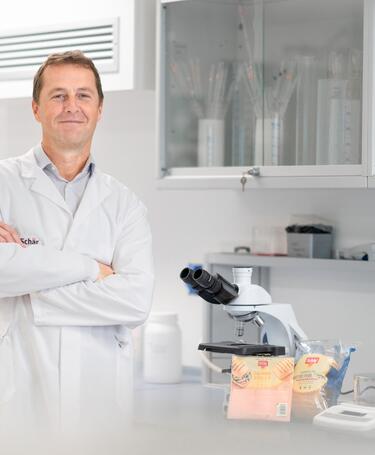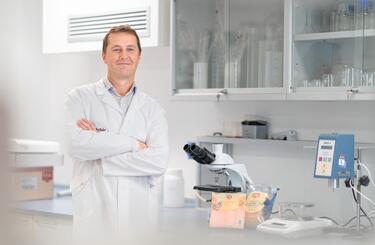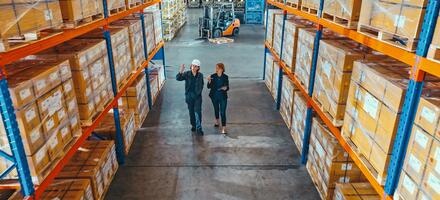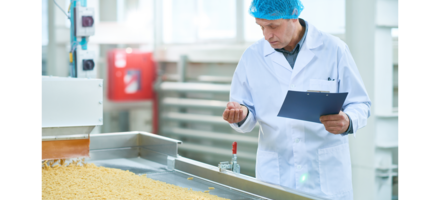
Ensuring quality is baked right in
Progress indicator

Manufacturer Dr Schär produces food for people with special nutritional needs, with quality at the heart of the production process from field to plate. Here, we take a closer look at a case study of an organisation that employs continuous improvement to meet stringent standards in food safety – and taste.
Quality standards are central to any kind of food production, but when it comes to the manufacturing of products for people with special dietary needs, such as coeliac disease or gluten sensitivity, maintaining stringent quality assurance is essential.
Global food manufacturer Dr Schär provides an excellent case study of the key importance of quality assurance and quality control when producing food to meet special requirements.
The vision from which the Dr Schär company was born had its roots in 1922, from a meeting between the medical practitioner Dr Anton Schär and his mill owner brother-in-law Gottfried Untertrifaller. The pair initially sought ways to improve the health of children in Europe after World War I via their diet, developing a wheat semolina to counteract calcium deficiency.
Italian businessman Ulrich Ladurner, who acquired the Dr Schär name in 1979, began developing gluten-free products in the 1980s and the company has continued to expand in size and in the specialist nutritional areas on which it focuses.
The organisation now has 18 sites in 12 countries, with its headquarters in the South Tyrol region of northern Italy.
From field to supermarket shelf
Ensuring high-quality end products begins in the field, as Dr Schär’s Director of Global Quality Assurance, Günther Augustin, explains.
"We work with naturally gluten-free raw materials, such as maize and rice, and our research in recent years has worked on minor crops like millet, buckwheat and quinoa. Our Research and Development (R&D) Centre is very involved at the earliest stages, working with the farmers, who are mainly located in northern Italy, to find the right varieties of grain and then make sure they are grown and harvested according to our standards," he says.
"Innovation is a pillar of our company. It starts with the raw materials we use, and to understand what the next step in the journey is, we have to know which are the important raw materials for the future and that they are suitable from a food safety point of view."
"These raw materials come to our production sites where the operative quality assurance begins. Our on-site quality assurance team checks all the raw materials and their packaging, and they are only released for production once they are sure that it all complies with all our specifications. We test every batch and only if it is OK, is it allowed to enter the production site; if not, we send it back to the supplier.
"After this, we go to the production process, which is monitored and checked at every stage. As people know, it is not easy to produce gluten-free products because we cannot use wheat flour, which is quite standardised and so always more or less the same. The grains we use to replace wheat are natural and so may vary, so we work hard to ensure the consistency of our end products.
"Not only do we check from a food safety aspect, we also must ensure the consistency of the product. Checking for foreign bodies is of course of great importance as part of food safety checks. There are a lot of parameters during production – and, of course, we check samples of the end product.

"Only once we know it complies with our standards is it released for sale. We then work with the logistics companies, warehouses and shops to ensure the product comes to the consumer in the best possible quality."
Value chain
The impact of political and economic instabilities in recent years has been seen on supermarket shelves across Europe.
"Supply chains have been quite challenging in recent years, starting with the pandemic and going on to the war in Ukraine, as well as many other elements that have impacted," says Augustin. "At Dr Schär, we have a proven brand structure and long-term suppliers. This stability has allowed us to navigate through these rough waters; the secret to our success lies in having an established and reliable network of suppliers who have been working with us for a long time and with whom we have long-term contracts.
"Thanks to our close cooperation with scientists, farmers and millers, we are involved throughout the entire value chain, from research to the supermarket."
Dr Schär’s research team of agronomists, food technologists and chemists work to establish which are the best grain varieties for the organisation’s gluten-free products.
"It is important to determine the balance of nutritional profiles and baking behaviour of the raw products, to meet production requirements as well as to meet consumer expectations," Augustin explains. "The team can then work with farmers to develop a cultivation plan that specifies the seeds to be used and the distance they are from neighbouring fields, to ensure no contamination with gluten products.
"Our farmers welcome this kind of close advice and support, and, by implementing the new processes and technologies, we have improved soil management. For example, water consumption and the use of fertilisers can be minimised through innovative methods, including crop rotations of different grain varieties to promote the natural balance of the soil and increase the natural nutrient content of the cereals."
Decreasing waste
Reducing waste is an important by-product of the right first-time approach that is at the heart of all quality production. In food production, this begins with the farming and extends all the way to the consumer’s home.
"Reducing waste is very important to us," Augustin says. "Waste can occur at different steps of the process – for example, an inconsistent product. We have worked to ensure consistency during production and so have reduced product waste to an absolute minimum. Waste can also occur with the raw materials, which is why we work hard with suppliers to avoid this happening.
"Another important topic is the packaging material. We need it to keep the product fresh during its shelf life so we cannot avoid packaging of some kind, but we are working to reduce this to a minimum. It must be the right size and thickness to reduce waste. We are working now to ensure that in the next few years, all packaging is either recycled, recyclable or fully compostable."
Continuous improvement
The Dr Schär brand has always been at the forefront in developing products for specific dietary needs and the organisation continues to refine its quality processes to drive this forward.
"Innovation is a pillar of our company. It starts with the raw materials we use, and to understand what the next step in the journey is, we have to know which are the important raw materials for the future and that they are suitable from a food safety point of view," Augustin explains.
"Then there is the product itself. The first gluten-free products were often tough or dry, difficult to eat, but our research and development team has worked very hard on the continuous improvement of the product. The goal is that someone cannot tell if a product is gluten-free or not – we want to produce a top-quality product that can be enjoyed as part of daily life."
Quality World

Get the latest news, interviews and features on quality in our industry leading magazine.
Quality Careers Hub

Exclusively for members, the CQI’s Quality Careers Hub is designed for every career stage. So whether you’re just starting out, ready to move on or up, or looking to build on your experience, there are many ways to progress.


